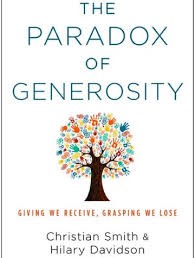The Importance of Vision
 The apostle Paul on one occasion urged his hearers to be generous, to share, and to remember those less fortunate. He quoted some famous words of Jesus:
The apostle Paul on one occasion urged his hearers to be generous, to share, and to remember those less fortunate. He quoted some famous words of Jesus:
In everything I did, I showed you that by this kind of hard work we help the weak, remembering the words the Lord Jesus himself said: ‘It is more blessed to give than to receive.’ Acts 20:35
‘It is more blessed to give than to receive’ is a very famous saying. You will notice why Paul uses it: so you can bless others.
If you consult the serious bible scholars, they will tell you that what Jesus is saying is that ‘it is better to give than to amass’. It is better to give out than to store up for yourself. It is better to have a giving attitude than a getting attitude. It is better to have a gracious heart than a greedy heart. It is better to be generous than grasping.
This emphasis comes from the word itself. Consider the classic version of the bible, the King James Version, which was translated in 1611, over for hundred years ago and was the standard version in English for three hundred and fifty years. If you do a word search, you won’t find the word ‘generous’ in it. The concept is there but the term they used was ‘liberal’.
A famous generosity verse, Proverbs 11:25, is thus translated: ‘the liberal soul shall be made fat, and he that watereth shall be watered also himself.’
‘Liberal’ in this context doesn’t mean the name of a political party or a progressive movement. The meaning is the same as when we say, ‘he put a liberal amount of tomato sauce on his scrambled eggs’. I do that and my wife Helen hates it. She says,’ you shouldn’t drown the eggs in sauce. It is just not right’.
I hope you get the meaning of ‘liberal’. The reason they didn’t use ‘generous’ in the King James Version is because four to five hundred years ago ‘generous’ didn’t mean what it does today. Back then it meant ‘noble’ such as being a member of the aristocracy, having birth and breeding to the manor born. A ‘generous’ person wasn’t a peasant. So if I described you as generous I would mean you were probably a lord or a lady, and I would doff my cap or curtsey to you.
But as the centuries wore on, 1300 1400 1500 1600 etc., the meaning of ‘generous’ changed from describing your noble birth to describing your noble character. If I call you ‘generous’ today I mean that you’re open hearted, friendly giving of your time, helpful. You will be happy to give to your church and needy causes. That is a wonderful thing.
Despite having written my book Giving Generously I struggle in this area but I would love it if you said, ’Rod. He is just a generous person’. That is something I desire to be. Consider the opposite for a minute. The opposite is miser. I don’t want to be thought a miser. The miser hoards, grasps, doesn’t give, doesn’t share. Misers are not just careful with money but tight, skinflint, cheapskate. I would absolutely hate it if you thought that of me.
Further, the miser is not happy. Did you know our word ‘miserable’ and the ‘word’ miser come from the same basic root? They come from the Latin root that means ‘wretched’.
To add weight to this, social science research indicates that generous people are happier, healthier, have more friends, enjoy more benefits, are more prosperous, and thrive in life. The ungenerous miserly ones are poorer, have less purpose, live for themselves, are sicker, and lonelier.
Jesus knew what he was talking about when he said, ‘It is more blessed to give than to receive’
So practice generosity. Your giving will be good for you. It will give you great joy. It will bless others but most importantly, it will give God glory.


 Smith leads the Science of Generosity Initiative at the University of Notre Dame in the U.S and Davidson has close involvement in the work. The study draws attention to the paradoxical, counter-intuitive nature of generosity. Here is the essence of it:
Smith leads the Science of Generosity Initiative at the University of Notre Dame in the U.S and Davidson has close involvement in the work. The study draws attention to the paradoxical, counter-intuitive nature of generosity. Here is the essence of it:
